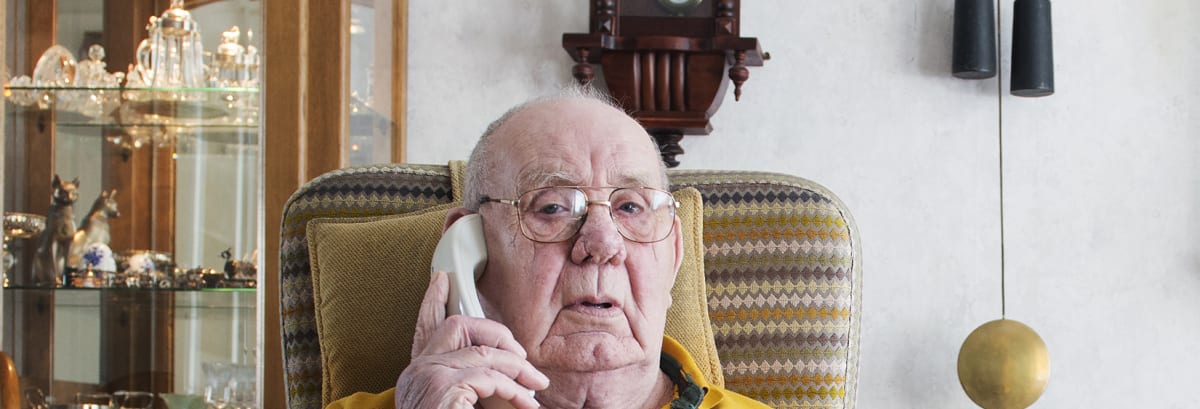Living at home with Reablement. 'I don’t have to wait for homecare anymore.'
Published on: 09-05-2023
More and more, healthcare providers are using the principles of ‘Reablement’ to look beyond the demand for care towards people’s underlying needs: what exactly does a person want to be able to do and how can we achieve this – with or without care? A method that fits seamlessly with two key objectives in a programme from the Netherlands Ministry of Health, Welfare and Sport, ‘Housing, Support and Care for Older People: by yourself if possible and at home if possible.’
Vilans interviewed a number of care professionals
A practical example emerged: Mrs. Leijsteen hardly ever left the house until a few months ago, and twice a week, homecare came to help her shower. During one such visit she told them, “I would like to be able to go out, but I can’t open and close the door myself and I can’t put on my coat by myself. I also don’t want to be asking people all the time, so unfortunately it’s no longer in the cards for me.’ She seemed resigned to it.
Reablement
A reablement program was initiated, in which caregivers actively teach people to do things on their own again. After several weeks of practicing with aids – supported by the district nurse and the occupational therapist – Mrs. Leijsteen was able to go out on her own again. Learning to shower again was still too scary for her, so homecare continued to support her in that. But Mrs. Leijsteen soon began to find it limiting that she had to coordinate her social life with home care. With smart tips from the occupational therapist, she then felt confident enough to shower independently. The homecare service no longer visits Mrs. Leijsteen but the offer that she can call anytime gives her peace of mind.
Longer at home and independent
Mrs. Leijsteen’s experience is a good example of Reablement. And also of the direction taken by the Dutch care sector. After all, healthcare is evolving: elderly people are living at home for longer and receive care and support from care providers such as homecare, physiotherapists and occupational therapists. There are also many options and solutions available in the home, resources that enable people to do things they would not dare to do without support.
Dependent
Older people often remain dependent on caregivers longer than necessary. This has consequences for their freedom and autonomy. In addition, the number of available care professionals in the Netherlands is limited. Effective use of professional care combined with boosting the independence of older people is very valuable.
Mindset shift for care professionals
Reablement requires a new way of thinking for care professionals. There are many habits that come from our care system, rules of thumb and old agreements within organisations and teams.
One healthcare professional interviewed says, “We were used to the fact that when someone had a request for a stairlift, we would go and arrange it because it’s a solution. But is it really the right solution to the real problem? The stairlift is requested because someone can no longer climb the stairs. So actually there is the need for someone to get upstairs. Let’s try to train and make someone strong to get back upstairs. It’s another way of thinking.”
Because someone can get back up the stairs, they may be able to do other things as well. It is also a matter of gaining experience with this method. Because Reablement often involves collaboration between professionals with different specialties, they also help each other develop a broader view of the client’s options. In addition, as a professional, you also develop a preventive view by working with Reablement. Another healthcare professional says: “Now that I know that the risk of incontinence increases by 13 times if someone no longer gets up from the chair by themselves because they are no longer training their pelvis, I realise that I sometimes unintentionally do more harm than good by taking things from people’s hands.
Getting older people enthusiastic
Reablement requires a different way of looking and behaving from care professionals, but also from older people and society. Care providers say that it is sometimes difficult to get people to work on self-reliance. Clients and family caregivers have different expectations of care: “But that’s what you’re there for, right?” This too, requires a shift in perspective and a good conversation. From assuming relief by caregivers to assuming independence for older people.
A project leader on Reablement says: ”If you turn it around and say to clients who are new to care: Welcome to care, from now on you are totally dependent and are going to give up your independence. Will you agree to that? In that case, nobody would want healthcare to take over, would they?”






